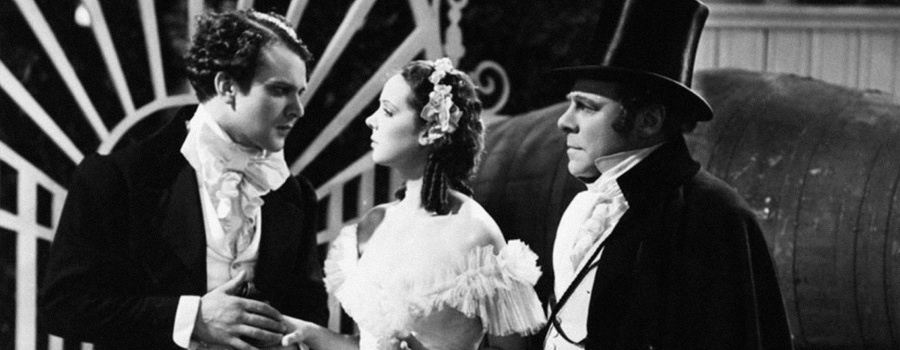A Year with Hitchcock: Waltzes from Vienna, by Reed Lackey
18 Jun
Hitchcock called this the low point of his career. He later called Champagne his least favorite of his films, but maintained that this movie represented an odd sort of crossroads and not an entirely pleasant one. Rich and Strange had been a good film but a commercial failure. Number Seventeen had represented a sloppiness in both style and substance, as if crafted by a hopelessly amateur filmmaker. Then, came Waltzes from Vienna, a film so utterly removed both by narrative and genre from the remainder of Hitchcock’s work as to seem ridiculously anomalous.
Oddly enough, given the great director’s sentiments about it, I really rather enjoyed this movie. Yes, the narrative is ultimately innocuous and considering what I already know is coming for Hitchcock’s catalogue, this small little film doesn’t provide much beyond a place holder in the filmography. But something about the overall effect really connected with me.
It tells the story of a young Johann Strauss, who longs to be a composer on the same level as his legendary father. However, he is being constantly pulled towards domestic mundanity by his fiancée and her proud father, as well as being pretty constantly discouraged about his dreams by his own father. He does, however, have two largely influential aristocratic fans, who would love to see him have a chance to capture the spotlight.
The story details the tensions in Strauss’s relationship, the struggles with his own ambition amidst the shadow of his successful father, and — most importantly — the creation and presentation of the legendary classical piece, “The Blue Danube”. The film has a handful of genuine laughs, some palpable tension in the subtext of the climate of class and individualism, and a surprisingly satisfying final few beats.
It’s certainly not what you’d expect from Hitchcock (unless, like me, you’ve been watching his films in chronological order). There is no real suspense beyond the domestic tensions and, like a handful of Hitch’s previous works, is often played for laughs. But I was surprised by three things:
1) I was surprised at how invested in the story I became. I’ve found myself struggling through some of Hitch’s earlier dramas, but this one kept me engaged for nearly its entire 75 minute run time. I connected with young Strauss’s dreams of receiving the chance to do what he loves and to have it approved by both his father and his audience. The performances aren’t particularly remarkable, but they are all entirely believable and they engrossing. Don’t miss the fun, amusing sequence in the bakery where Strauss’s potential father-in-law is trying to teach Strauss about the trade, but Strauss can’t stop hearing every noise in the building as part of a greater symphony. It’s wonderfully on point for anyone who’s ever felt distracted by their real passions while struggling to perform their day job.
2) I was surprised at how focused it all felt. So many of Hitch’s dramas have felt somewhat lost, either visually or narratively, as if they were trying to discover where they were going as they were already on their way (an unusual feeling considering how many of his films were stage adaptations). But this one feels focused and has a direct payoff for every single one of its narrative threads. Basically, it’s a pretty satisfying little film.
3) Because of these compliments, I was surprised Hitchcock considers it his low point. It was largely driven by his public reputation at the time, and resulted in his former producer Michael Balcon (who had given Hitchcock his very first chance at directing) stepping in to redirect the spiral Hitchcock found himself in by producing The Man Who Knew Too Much.
I was prepared to drag myself through Waltzes from Vienna as best I could, but wound up walking away with one of my favorite experiences from his early films. I know that he was floundering career-wise at this stage behind the scenes and perhaps that flavors his memory of making this film. But the result, while still far from essential is also far from disposable.
The film is pleasant and satisfying, even if it is still very minor in the collection. And there is a prophetic note to be appreciated that from here, Hitchcock begins to make some of his more signature and noteworthy films. The coda to his long period of aimlessness in artistry is a film about a man who knows he has greatness in him, if only he can find the avenue through which to express it.
I think, in considering Hitchcock’s filmography, that it’s an entirely appropriate metaphorical coda indeed.
Summary:
Accessibility – Difficult to find, no current formal release
Themes – Social Dilemmas, Ambition, Familial Competition
Category – Good, for the Curious




No comments yet